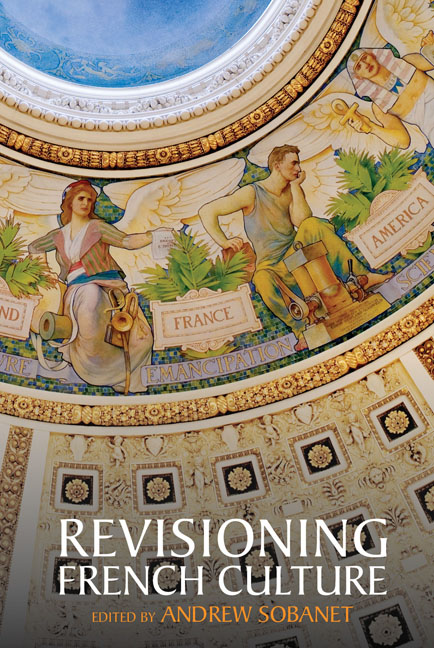Book contents
- Frontmatter
- Contents
- Introduction
- I France in Perspective: The Hexagon, Francophonie, Europe
- II Visions of the World Wars, or L’Histoire avec sa grande hache
- III Refractions and Reflections
- IV French Literature, Revisioned
- V The Subject in Focus
- VI Philosophical Lenses
- VII Coda
- Contributors
- Acknowledgments
- Index
21 - Making History or Preventing the World from Unraveling
- Frontmatter
- Contents
- Introduction
- I France in Perspective: The Hexagon, Francophonie, Europe
- II Visions of the World Wars, or L’Histoire avec sa grande hache
- III Refractions and Reflections
- IV French Literature, Revisioned
- V The Subject in Focus
- VI Philosophical Lenses
- VII Coda
- Contributors
- Acknowledgments
- Index
Summary
Each generation doubtless feels destined to remake the world. Mine, however, knows it will not remake it. But its task is perhaps even greater. It consists in preventing the world from unraveling.
Albert Camus, ‘Discours de Stockholm,’ Stockholm, Sweden, December 10, 1957In the postwar years around 1950, the attitude toward history oscillated between two extremes: that of denial, or that of allegiance. The denial of history is represented by what Mircea Eliade called the ‘terror of history,’ a theory developed in Le Mythe de l’éternel retour, which quickly became a touchstone after its publication in 1949. In it, Eliade proclaims his growing ‘disgust’ for history. He argues against what he calls Hegel's and Marx's ‘historicism,’ against existentialism, against the ‘fall’ into history. According to Eliade, ‘primitive peoples’ effectively inhabit ‘the paradise of archetypes’ and practice periodic regeneration; time is thus prevented from ‘transforming into history.’ For those confronted by history, the worst off are those who find themselves unwillingly on the ‘path of history.’ Such is the case of the peoples of Southeast Europe, neighbors of ever-expanding empires who experience history as suffering, terror, and sacrifice—nothing more. As opposed to the ‘modern’ counterpart, ‘primitive man’ lives in a continual present: ‘Every year, he has the liberty to annul his mistakes, to erase the memory of his fall into history and to try, once again, to definitively exit time.’ Eliade endeavored to apply this principle to his own life.
The other extreme was that of a faith in history, driven by the hope of revolution, by the progress of science and technology, and by the calls to turn resolutely toward the future. To make history is an objective, if not an imperative. Even the atomic bomb dropped on Hiroshima could be hailed, on August 8, 1945, as a technological advance. Albert Camus, however, was one of the very few to denounce, in his newspaper Combat, ‘the terrifying prospects that are revealing themselves to humanity.’ Despite the deep fissures caused by the war, there was a revival of the modern regime of historicity in the postwar period, which would again be accentuated and even accelerated by the Cold War: from the race to modernization to the arms race. Between denial and faith lies the spectrum of possible positions.
- Type
- Chapter
- Information
- Revisioning French Culture , pp. 303 - 314Publisher: Liverpool University PressPrint publication year: 2019



